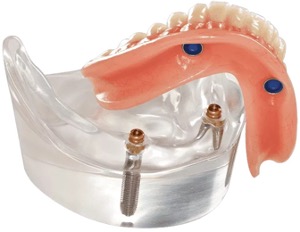

By Leanne.
Share article:
Myth: Dental Implants have a low success rate.
After a long history of trial and error, from the early beginnings in the mid-1960s to the first commercialised dental implants in the late 1970s, Dental Implantology is now a genuinely successful and booming field within the health industry. Through the use of innovative medical technology and bio-compatible materials (no shells or cadaver teeth here), dental implants now have between a 95% and 98% success rate.

Myth: Dental implants don’t last very long.
The truth is dental implants have an excellent success rate when performed by qualified professionals. In fact, implants are among the most successful cosmetic dentistry procedures, with a 95 – 98% success rate, meaning nearly all patients have long-lasting results.
The very first dental implant placed by Branemark lasted over 40 years until the patient’s death.
Every patient is different, and there are no guarantees, but implants can last a long time if they are properly maintained.
Be sure to brush, floss, and see a dentist regularly, just like with your natural teeth.

Myth: Dental implants are only for the elderly.
- 35 and 54 were missing, on average, 3.6 teeth
- 55-74-year-olds were missing 8.8 teeth
- 75 years of age were missing 13.2 teeth

Myth: Dental implants have long-term health implications.
- Infection
- Nerve damage (which is usually temporary)
- Injury to the surrounding structures

Myth: Dental implants aren’t as strong or durable as natural teeth.
A dental implant integrates with the jaw in a natural process known as osseointegration to closely mirror a natural tooth’s look, strength, and function. To date, they are the strongest form of tooth replacement, and they do not decay.
Nobody, hopefully, is having good strong teeth with solid foundations ripped out of their jawbones to replace with implants.
However, the combination of a titanium frame and a zirconia tooth is extremely strong and durable and is stronger than the natural ageing or decaying teeth that are being replaced.

Myth: Dental implant bridges will last forever.
The dental implant itself should last a lifetime if it has been appropriately placed. It’s made of very sturdy titanium, so you should never have to return for an update or any modifications. However, the crown on top of a single implant or full arch bridge may not last as long. Crowns last 10-15 years, depending on how well they are cared for. So, you will eventually need to get a new crown or bridge.

Myth: All dental implants are the same and are made to the same quality.
When you consider any type of surgical procedure or prosthetic device, you need to weigh up the quality of the implants and components equally with the price of the procedure.
Your health is on the line here. The results of shopping for bargain implant procedures often come with the use of inferior components.
As a way to cut costs, the labs that fabricate your implant bridge will often use inferior materials. This can lead to a poor quality, ill-fitting bridge with functionality issues, increased risk of infection and poor aesthetics.
All at Once® providers use only the best quality components and work with industry leaders.

Myth: Snap-in or over-dentures have no ongoing costs.
- Dentures – approx 25%
- Snap-in – approx 40-50%
- All at Once® > 85% bite force.

Myth: Anyone can place dental implants.
Not every dentist has the extensive training needed for surgically placing dental implants or understanding all the potential complications that can arise during the procedure.
Dental implants are highly successful when planned, designed and performed by a team of experienced dental practitioners.


Disclaimer: The information provided on this platform, including text, graphics, and images, is intended for general informational purposes only. It is not a substitute for professional dental advice, diagnosis, or treatment. For specific dental concerns, it is crucial to consult with a qualified dental practitioner. They will be able to assess your individual circumstances, provide accurate diagnoses, and offer appropriate treatment options tailored to your specific needs
Print article:
Share article:
Subscribe To Leanne's Blog
Ready for your new smile?


